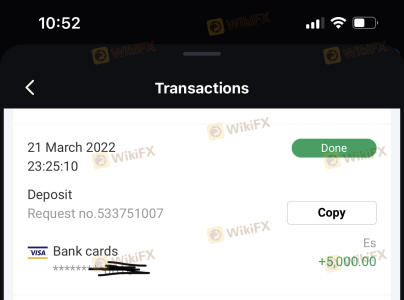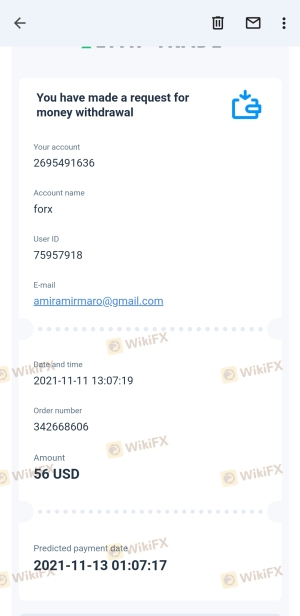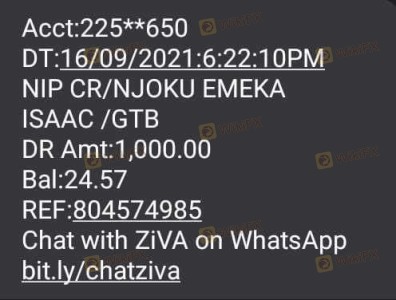Is OLYMP TRADE safe?

Business

License

Is Olymp Trade A Scam?
Introduction
Olymp Trade is an online trading platform that has gained significant attention since its inception in 2014. It positions itself primarily in the realm of forex and binary options trading, catering to both novice and experienced traders. The platform claims to provide a user-friendly interface, a variety of trading instruments, and educational resources to enhance the trading experience. However, the rapid growth of online trading has also led to an influx of scams and unregulated brokers, prompting traders to exercise caution when selecting a trading partner.
In this article, we will objectively evaluate whether Olymp Trade is a scam or a legitimate trading platform. Our investigation will encompass a thorough analysis of the broker's regulatory status, company background, trading conditions, customer fund safety, and user experiences. This evaluation is based on information gathered from reputable financial websites, user reviews, and regulatory databases, ensuring a comprehensive understanding of the platform's credibility.
Regulation and Legitimacy
Regulation is a crucial aspect of online trading, as it provides a layer of security for traders. Olymp Trade claims to be a member of the International Financial Commission (IFC), which offers a compensation fund for traders in the event of broker disputes. However, it is essential to note that the platform does not hold licenses from top-tier regulatory bodies like the Financial Conduct Authority (FCA) in the UK or the Australian Securities and Investments Commission (ASIC).
Here is a summary of the regulatory information for Olymp Trade:
| Regulatory Body | License Number | Regulatory Region | Verification Status |
|---|---|---|---|
| International Financial Commission (IFC) | N/A | Offshore (St. Vincent and the Grenadines) | Verified Membership |
The quality of regulation is a significant concern. While the IFC provides some level of oversight, it does not match the stringent requirements of top-tier regulators. The absence of a robust regulatory framework raises questions about the safety of traders' funds and the overall transparency of the broker's operations.
Company Background Investigation
Olymp Trade is owned by Saledo Global LLC and operates from St. Vincent and the Grenadines, a location known for its lenient financial regulations. The company has made strides in establishing itself as a reputable broker, with claims of millions of users and substantial trading volumes. However, the lack of detailed information regarding the management team and their qualifications raises concerns about the broker's transparency.
The management team‘s background is crucial in evaluating the broker's reliability. A well-experienced team can contribute to better trading conditions and customer support. Unfortunately, there is limited publicly available information about the individuals behind Olymp Trade, which can be a red flag for potential investors. Furthermore, the company’s history of compliance with regulatory standards remains unclear, given its offshore registration.
Trading Conditions Analysis
Olymp Trade offers a competitive trading environment with a low minimum deposit of $10 and a minimum trade amount of $1. However, it is essential to scrutinize the overall fee structure and any hidden costs that may affect traders' profitability.
Heres a comparison of core trading costs:
| Fee Type | Olymp Trade | Industry Average |
|---|---|---|
| Major Currency Pair Spread | 1.1 pips | 1.0 - 2.0 pips |
| Commission Model | None | Varies (typically $4 per lot) |
| Overnight Interest Range | 0.0038% | 0.5% - 2% |
While Olymp Trade does not charge commissions on trades, it does impose an inactivity fee of $10 per month after 180 days of inactivity. This fee structure is relatively common among brokers, but the lack of detailed information on spreads and commissions for other asset classes may lead to unexpected costs for traders.
Customer Fund Safety
The safety of customer funds is paramount when choosing a trading platform. Olymp Trade claims to implement several measures to protect traders' funds, including negative balance protection and compliance with Know Your Customer (KYC) regulations. However, the effectiveness of these measures is often contingent on the regulatory framework within which the broker operates.
The broker does not segregate client funds, which means that traders' money may not be kept in separate accounts from the broker's operational funds. This practice can pose a risk, especially in the event of financial difficulties faced by the broker. Additionally, while the IFC provides a compensation fund for disputes, it is limited to €20,000, which may not cover all potential losses for traders.
Customer Experience and Complaints
User feedback is a valuable indicator of a broker's reliability. Olymp Trade has garnered a mixture of positive and negative reviews, with many users praising its user-friendly platform and educational resources. However, common complaints include issues with withdrawals and discrepancies in trade execution.
The following table summarizes the main types of complaints and their severity:
| Complaint Type | Severity | Company Response |
|---|---|---|
| Withdrawal Issues | High | Slow response times reported |
| Trade Execution Discrepancies | Medium | Limited resolution offered |
| Customer Support Quality | Medium | Generally responsive but inconsistent |
Typical cases include users reporting delays in withdrawal processing and discrepancies between demo and live account performance. These issues can significantly impact traders' trust in the platform and highlight potential areas for improvement in customer service.
Platform and Trade Execution
The performance of the trading platform is a critical factor in the overall trading experience. Olymp Trade offers a proprietary platform that is generally regarded as user-friendly. However, the quality of order execution, including slippage and rejection rates, is crucial for traders, particularly in fast-moving markets.
Traders have reported varying experiences regarding order execution quality, with some noting instances of slippage during volatile market conditions. While the platform appears stable overall, any signs of manipulation or execution issues can raise concerns about the broker's integrity.
Risk Assessment
Using Olymp Trade involves various risks that traders should be aware of. The lack of robust regulation, potential withdrawal issues, and the absence of fund segregation contribute to a higher risk profile for this broker.
Heres a risk scorecard summarizing key risk areas:
| Risk Category | Risk Level (Low/Medium/High) | Brief Explanation |
|---|---|---|
| Regulatory Risk | High | Lack of regulation from top-tier authorities |
| Fund Safety | Medium | No segregation of client funds |
| Execution Quality | Medium | Reports of slippage and discrepancies |
| Customer Support | Medium | Mixed feedback on responsiveness |
To mitigate these risks, traders should conduct thorough research, utilize the demo account for practice, and consider only investing funds they can afford to lose.
Conclusion and Recommendations
In conclusion, while Olymp Trade offers a range of attractive features, including a low minimum deposit and a user-friendly platform, several red flags warrant caution. The lack of regulation from top-tier authorities, potential withdrawal issues, and mixed customer feedback suggest that traders should approach this broker with care.
For traders who prioritize safety and regulatory oversight, it may be wise to consider alternative brokers that are fully regulated and offer stronger investor protection. Some recommended alternatives include brokers like IG, OANDA, and eToro, which provide a more secure trading environment with comprehensive regulatory oversight.
Ultimately, each trader must weigh the benefits and risks associated with Olymp Trade and make an informed decision based on their trading goals and risk tolerance.
Is OLYMP TRADE a scam, or is it legit?
The latest exposure and evaluation content of OLYMP TRADE brokers.




OLYMP TRADE Similar Brokers Safe
Whether it is a legitimate broker to see if the market is regulated; start investing in Forex App whether it is safe or a scam, check whether there is a license.
OLYMP TRADE latest industry rating score is 1.56, the higher the score the safer it is out of 10, the more regulatory licenses the more legitimate it is. 1.56 If the score is too low, there is a risk of being scammed, please pay attention to the choice to avoid.